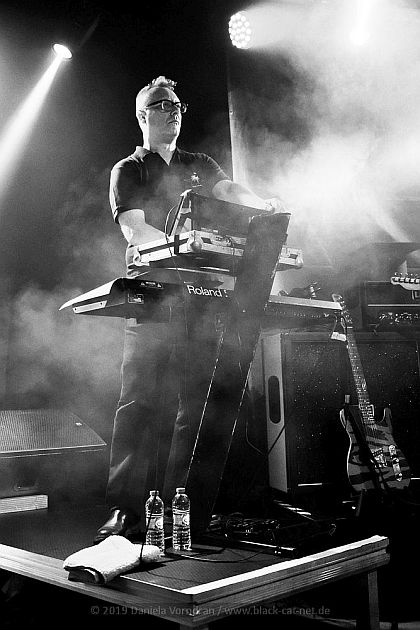 Interview with
Interview with Ralf Dörper (synths) from Die Krupps
A walking, breathing source of incredible stories - DIE KRUPPS, PROPAGANDA, soundtracks and films and enormous overview on the music scene. In our cycle of interviews with the members of DIE KRUPPS I had a pleasure to ask a few questions to Ralf Dörper who is responsible for synths in DIE KRUPPS. Incredibly experienced in music and yet very modest - with Ralf Dörper about the history of the band, some hints on inspirations and planning the future.
Reflections of Darkness [RoD]: Ralf, you were in and out of DIE KRUPPS (1980-1982, 1985, 1989-1997, 2005-present). Please tell me about your history and experience with the band.
Ralf: I am tempted to answer by quoting PROPAGANDA: “never look back” or from DIE KRUPPS “Ein Blick zurück im Zorn und dann nur noch nach vorn”, but it might be more interesting and entertaining to provide some details... You’ve mentioned the timeline, roughly 25 years of activity for me within the 40 years, but that is something like 90% as DIE KRUPPS were in hiatus for some time as well. With regard to the recordings this means:
from ‘Stahlwerksinfonie’ to ‘Volle Kraft Voraus’
from ‘Machineries of Joy’ to ‘Paradise Now’
from ‘Der Amboss’ to ‘Vision2020’.
1. How did it start? I’ve recently discovered a poster (which I also posted on Facebook) for a festival which took place Nov 1 1980 in Berlin. It featured all the important new bands from Germany among which was MALE, Jürgen’s Punk band, having changed its name already to VORSPRUNG. After that show VORSPRUNG split into halves - one half was Bernward Malaka and Jürgen Engler. Not sure if they had prepared the ‘Stahlwerksinfonie’ demo at that time already, but that´s what they had worked on. An instrumental piece with harsh guitar and dub effects. And they had recruited an avantgarde drummer for that piece: Frank Köllges. So, it was a clear departure from Punk. I quite liked what I heard and thought I could possibly add some metallic sounding percussion - I just said that because I had (impressed by JOY DIVISION) acquired a Synare and a Pearl Syncussion (although percussion never was my thing). Around that time, I had already done a little musical project with Jürgen for a Düsseldorf X-mas compilation as DIE LEMMINGE which we continued with a single in 1981...
But coming back to the topic - I even liked the ‘Stahlwerksinfonie’ more, when a few weeks later Jürgen mentioned the name of the new band: DIE KRUPPS. That was a proper name in my opinion and a perfect fit for the new sound. It also provided a scope of associations... like work, toil, industry, exploitation (topics which I later worked into ‘Wahre Arbeit Wahrer Lohn’). But to cut a long story short: I ended up with the three (plus Jürgen’s then-girlfriend who played saxophone) in CAN’s studio where we recorded the ‘Stahlwerksinfonie’ live. First the “sinfonia” in one go, after that we filled further tracks in a second-round with metal percussion... A few days later we were in another studio - Conny Plank’s - to mix it. For the dub-part we all had to push buttons on the mixing desk... Based on its release early in 1981, we played our very first concert in June supporting Red Crayola. And after that a few more supporting DAF.
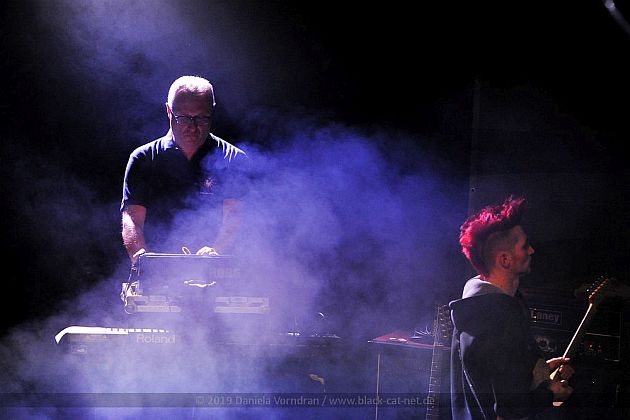
For these shows we had started on a couple of songs which were songs in fact, vocals included. One of those was ‘Wahre Arbeit Wahrer Lohn’. We were lucky to record WAWL in a new studio in Düsseldorf which had a step-sequencer (at that time synthesizer-systems were still quite expensive...) and Jürgen had “invented” his steel-(xy)lophon. That single became quite successful in the German clubs. And it also made us known internationally as the British music paper New Musical Express gave us a one-page review of WAWL and SWS. That was quite a sensation. German major labels seemed to read the NME - as offers started to pour in. Being aware of the interest we started to record our first album ‘Volle Kraft Voraus’ - without drums to avoid being too close to the DAF-sound. The year ended with a bang - at least for myself. We did a Christmas show/case at a Düsseldorf discotheque where WAWL had been a big floor-filler. We played live to backing tapes of the already recorded ‘Volle Kraft Voraus’ - me hitting on the syncussions... The day after the show I was asked to leave... I hung around for a few more weeks to see a deal signed with the major WEA - and to secure my payment. I didn’t secure the size of typo used for my credits on the album sleeve - but anyway... Later in 1982 I started PROPAGANDA which is another story...
2. How did it restart? I was living in London at the end of the 80s. PROPAGANDA (minus singer CB) had won the legal battle against ZTT and got released from the contracts. We managed to score a new mega-deal with Virgin Records, found a new singer (American) and had expanded the band line-up by the former SIMPLE MINDS rhythm section. And I became bored with pop music. I had discovered Detroit Techno and Chicago Acid (in my flat I was listening to London pirate radio LWR) and at the London rave clubs I heard sounds that very much reminded me of DAF (or DIE KRUPPS or FRONT 242) - by the way at a concert showcase at the NY New Music Seminar 1985 PROPAGANDA was supported by FRONT 242 - somehow the musical underground in 88 was back to the minimal and hard sounds of the early 80s. In fact, Acid was made with a little machine I got in 82 - on which early ‘Dr Mabuse’ was programmed... the Roland Bassline TR 303. So, I started to play around with it and the idea to make an acid record was imminent. But unfortunately, I was signed exclusively to Virgin Records as an artist. That could be a problem. But as a producer... It helped that Andreas Thein (with whom I had started PROPAGANDA back in 82) was always pushing to do some collaboration.
Now was the time to do it: the resulting single, ‘Dr Acid & Mr House’ was done in three days. It went Top Twenty in Germany and became a big club hit in Southern Europe. And it brought back the excitement - I continued to work with Jochen Schmidt the Fairlight Programmer of the ‘Acid-Sessions’ (who died early in 2020). I wanted to do a sort of HiTek-EBM referencing the Düsseldorf heritage. And with the help of my manager who also managed the Mute band WIRE at that time, I got in touch with NITZER EBB. So ‘Machineries’ was pretty much realized when I asked Jürgen to sing on it. In the end, we decided to produce it together and have it released as a DIE KRUPPS record, as I had to be careful regarding my contract with Virgin. That is why there is little info on the record sleeve and why I wear a helmet in the video. ‘Machineries’. which is not just an update of ‘Wahre Arbeit’, was released on BCM Records (who had released Dr Acid) on the Continent, on Mute Records in the UK and - due to the NITZER EBB involvement - on Geffen in the USA where it even reached the Billboard Charts. Based on the fun and success of these two records I decided to leave PROPAGANDA in 1990 before the release of ‘1234’. That album did rather well in some territories. A ballad I had written – ‘Only one Word’ - became a no1 in Argentina. And Jürgen ended his affiliation with the record label AtomH he had built up since the mid-eighties after he had put DIE KRUPPS to rest.
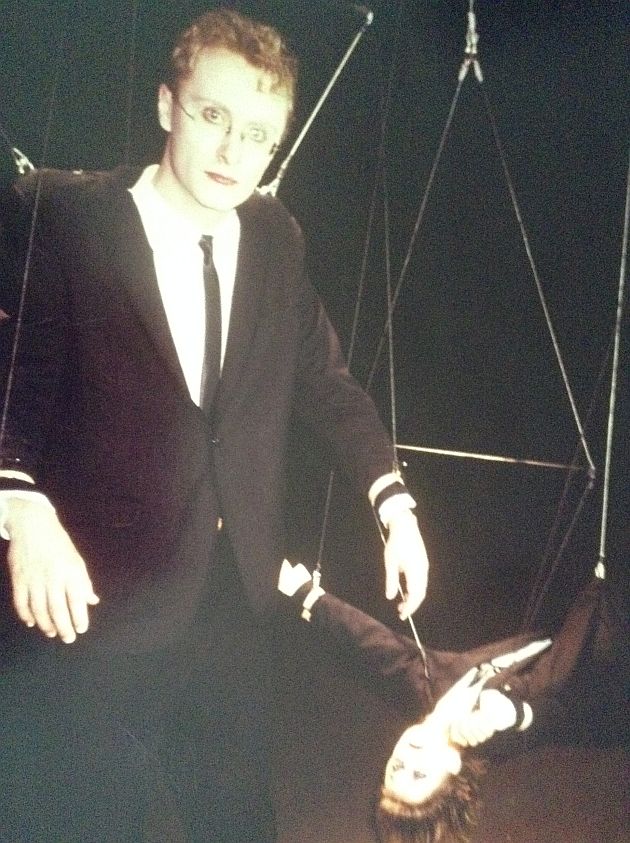
DIE KRUPPS were active again! With PROPAGANDA I had started straight at the top-end. Top producer, chart hits, big media exposure... so now I was able to experience the standard procedure of gaining a career with DIE KRUPPS. We had to take the long path to glory, the true work. Getting into the van, later the nightliner... playing clubs and later concerts halls. A very rewarding experience was to play in Eastern Germany early after the reunification. Songs like ‘Germaniac’ or ‘Fatherland’ were inspired by those times. In the 90s the Metalmorphosis of DIE KRUPPS took place. The Electro years morphed into the Metal years. More guitars more hair more tours more excess more stupidity. It ended all in 1997. We left the tour bus. Jürgen left for America - I left the music business (having seen enough)...
3. A new beginning. Plenty of water under the burned bridges, a good reason (25th anniversary) and the demand from a new generation made us get together again in 2005. This black scene which we knew from the 90s had evolved big time and had given birth to new venues and festivals: do we played the Amphi, the WGT and M’era Luna, the first time in Russia etc. And we were still recognized in the Metal arena - and even played Wacken or Full Force... And as we do not want to be just a legacy band playing variations of greatest hits shows DIE KRUPPS recorded again - so far three new and one live album in this decade. It is now the longest period of time DIE KRUPPS are working together which I think is also due to the now solid line-up which even became more solid by having Nils and Paul join the elders of Jürgen, Marcel and me.
RoD: DIE KRUPPS will celebrate their 40th anniversary next year. 40 years is quite a time for a band, especially in the alternative scene. What do you think it takes to keep on for this long?
Ralf: It’s true, the foundation of DIE KRUPPS was late 1980, 40 years ago. And the first recordings and tour in 1981. But there were substantial gaps. So, it was possible to learn from mistakes that were made in the past. The gaps provided the opportunity to reflect. And experience powers the stamina.
RoD: What first brought you to music?
Ralf: Punk / ‘Warm Leatherette’ by THE NORMAL / machines from Japan. I had got no musical education and was not interested in playing (or even touching) a conventional instrument. Consequently, I never was in any school band. When I got involved with the Düsseldorf Punk scene it initially was not on stage but by writing for a fanzine. However, the release of ‘Warm Leatherette’ - as well as the emergence of the first generation of cheap synthesizers from Japan such as the Korg MS series - inspired me to perform a funny interpretation I called ‘Warm/Kalt’ on some Punk festival. This also led to me becoming part of S.Y.P.H one of Germany’s early Punk bands with strong leanings towards Krautrock imponderability... I appeared on the very first EP from S.Y.P.H playing some synth - and doing even some vocals... I recorded a solo single in 1980. It was instrumental and referred to the soundtracks to the movies of two filmmakers I admired: David Lynch’s ‘Eraserhead’ and John Carpenter’s ‘Assault’. The single was released on a small Düsseldorf label called RONDO. It became a “single of the week” in the British music paper NME but was widely ignored in Germany. All my early quite obscure recordings have been compiled recently in Japan and were released on SUEZAN STUDIOS under the title ‘Kalter Lärm’.
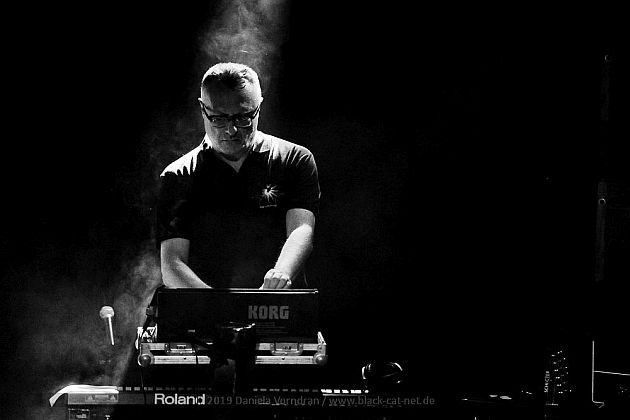
RoD: In 1982 you left DIE KRUPPS to start your own band. The history of PROPAGANDA is actually very interesting, and to be frank, quite stormy, too. What made you form the band in the first place? Could you tell me more about how the band was functioning in the past and what the status of it is now? You worked in the UK in the early 80s - what was the scene like back then?
Ralf: We should talk about PROPAGANDA in two years-time, as that 40-year anniversary would be in 2022. But OK, just in short. I was influenced by bands like CABARET VOLTAIRE, THE NORMAL and THROBBING GRISTLE. And the idea was to make sequencer-driven songs with female voice/s. (That was before Anne Clark). The first recording we made (in a studio in Essen as they had a PPG) was a version of/or inspired by THROBBING GRISTLE’s ‘Discipline’ which draw the interest of Paul Morley who was planning a label with Trevor Horn (who had produced Malcolm MacLaren and ABC)... By the way, that connection was made by Chris Bohn, the writer who at the NME had championed my first single and later ‘Wahre Arbeit...’
However, I have to stress that luck played a big part. These were lucky coincidences meeting Andreas Thein or Michael Mertens. And there was plenty of luck involved that we were signed by ZTT in 1983, that Trevor Horn produced ‘Dr Mabuse’, that Anton Corbijn did the video and so on... The unlucky parts were the unfair contracts... But the compensations are the hits and the legacy. Our album ‘A secret wish’ is constantly reissued and thus kept available. And most 80s compilations feature either ‘Dr Mabuse’ or ‘Duel’ or ‘P-Machinery’ depending on which country. Now my last words on PROPAGANDA: PROPAGANDA was never about “me too”, about following trends. So, a reunion for the sake of being nostalgic is no option (for me).
RoD: When I was going through the history of PROPAGANDA, I noticed there were lots of changes in the line-up, that leads to me a question - are such changes a natural thing for long-term bands? What do you find the most difficult about working in bands such as DIE KRUPPS or PROPAGANDA? Are these personal issues, business/ legal points with labels or differences in musical taste? Or any other?
Ralf: Sorry, but you can hardly compare these two: Different leagues. But if you look for the lowest common denominator (‘LCD’, hey, a KRUPPS title) you might find some common ground. I have experienced - in both bands - that with success/ fame and money (however big) very often come envy, greed, megalomania, ego trips, excess, stupidity. This might explain that some careers are often very short. The supernova syndrome. With regard to the musical aspect (in DIE KRUPPS) it should be noted that we have a certain Spinal Tap phenomenon with regard to the drummers. Looking back, it is nearly a new drummer every tour - for different reasons... KRUPPS’ drummers have to be comfortable playing with a sequence. And they have to be comfortable with not too much live action - i.e. there are not 200 concerts a year...
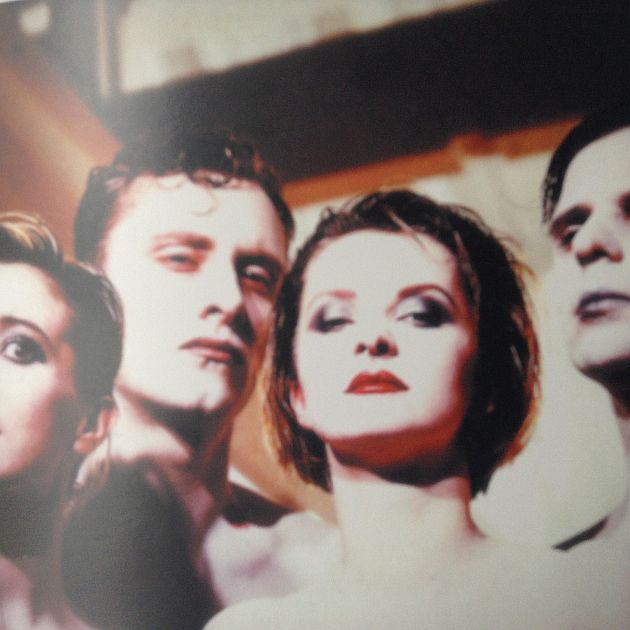
RoD: Do you look at the music-making differently now? Are you more distanced to it? What has changed in your approach to the creative process?
Ralf: When I left the tour bus in 1997, I left the music business.
RoD: What do you find the best about being a part of DIE KRUPPS?
Ralf: The aspect of “too much history” is the best and the worst about DIE KRUPPS. Depending on the location we are seen as EBM or Metal or NDH - but thanks a lot not as NDW anymore. But we are fortunate that we are not limited to one or two territories. We have fans on all continents. And getting in new blood every few years prevents things from becoming boring or predictable...
RoD: Do you have a favourite album by DIE KRUPPS? Or the one you’re particularly proud of?
Ralf: This question comes a bit too early. We might do a compilation of the story so far, i.e. a continuation of the PAST FORWARD compilation which covered the 80s... So, I am listening to and rediscovering those records of the 90s and the more recent ones. I guess I will end up with one favourite in each decade. Oh, by the way, I quite enjoy the ‘StahlwerkRequiem’ as it does not feature a saxophone which is not my favourite instrument.
RoD: During your career, you met various people. Do you remember a particular person or a meeting that was especially important to you? Have people been an inspiration for you? Where do you actually take inspiration from while writing new music?
Ralf: I am not so impressionable (any more). But I should mention meeting Ralf & Florian, Daniel Miller, and Kirk@Mallinder were important occasions for me. But even more impressive encounters I had in my life as an (equity) analyst - speak to Industrial Leaders: the managers of ThyssenKrupp: Cromme, Scholz, Hiesinger and hear about their visions was really interesting. Unfortunately, I never met Berthold Beitz. He was the guy heading the Krupps Foundation. He had the big task to convince the son of Alfred Krupp - Arndt - to give up his inheritance (for the sake of the fatherland)... That was actually an inspiration for ‘Im Schatten der Ringe’. In fact, before we decided to do another record (‘The Machinists of Joy’) I had been working on the idea of a musical about the Krupps dynasty - working title was ‘Essenbeck’...
Inspiration? My very first record - a single released on Rondo Records in 1980 - was an homage to John Carpenter and David Lynch, inspired by their movies - and their soundtracks... So, movies play quite a role as well as books. Especially regarding writing words. You find some references in song titles towards books - ‘Machineries of Joy’, ‘Fatherland’ or ‘Nazis auf Speed’ - but these are mostly additional hints and associations. The first verse for ‘Nazis...’ I actually wrote the day after I’ve seen a RAMMSTEIN concert. A bit of a parody... “rammt sie”… Music wise I am back full circle, i.e. soundtracks. The ‘Importance of Noise’. To give you some names: Ben Frost, Johann Johannsson, Clint Mansell, Hildur Gudnadottir among others. But no, no interest to do soundtracks. You are too much depending on other people’s decision making.
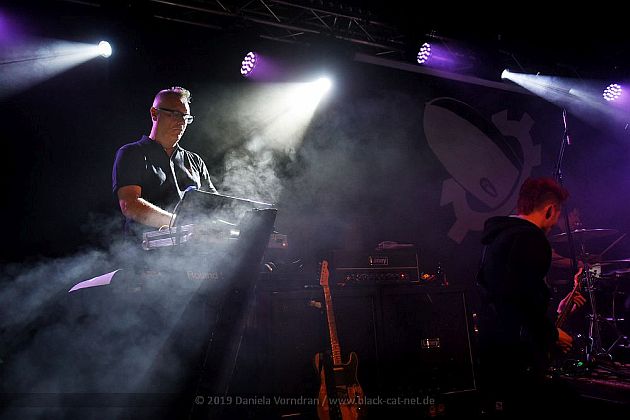
RoD: When I was talking to Marcel or Nils, they mentioned their drive is anger or pure passion for music. What is your own fuel as a musician? What keeps you being creative?
Ralf: Anger is an energy. And the guitar is a good instrument to express anger - especially with some big Marshall stacks behind you. But oscillators can be fierce as well: and when I press a special key it plays a little cacophony...
RoD: The future is definitely uncertain now, even more than before - are you planning anything at this point?
Ralf: Making plans is always possible. But nowadays you have to adjust constantly. Sometimes that feels like making nowhere plans for nobody. Early this week Pfizer / Biontec announced the success regarding a vaccine... At the stock exchange their share prices rose - so did those of the concert company Eventim - and of ThyssenKrupp - an omen? Also, this week I saw Angus Young of AC/DC announcing that they would wait with touring until all is over - because the audience is their sixth member - even if its 22/23. That would be our Worst-Case Scenario (Hey, another KRUPPS song). We will try to find opportunities to celebrate the KRUPPS anniversary in front of a real non-virtual audience. And if it comes to the worst, i.e. a larger gap of inactivity... History showed that DIE KRUPPS are very much gap-experienced.
RoD: Thank you very much for your time!
Ralf: Thank you
Live pictures by Daniela Vorndran (http://www.vorndranphotography.com / http://www.facebook.com/blackcatnet) / Pictures of PROPAGANDA - Ralf Dörper archive






Comments powered by CComment